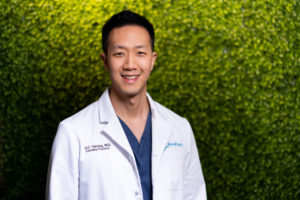 Health Matters is a biweekly opinion column. The views expressed are solely the author’s.
Health Matters is a biweekly opinion column. The views expressed are solely the author’s.
“It felt like they were tickling my brain.”
No, my patient wasn’t describing a complex neurosurgery. He was describing the 6-inch nasal swab used to sample his nose for COVID-19 testing, a common requirement before proceeding to surgery.
Virginia recently initiated Phase 3 reopening, and like the increasing sidewalk bustle on Wilson Boulevard, operating rooms have also been reinvigorated as elective surgeries are once again being performed. If you are like many Americans that have delayed care due to coronavirus, you may be wondering “Is it safe to have elective surgery during COVID?”
In fact, half of Americans postponed medical care due to COVID, and a third of those plan to get care in the next 3 months. Demand far exceeds supply, and some experts estimate an elective surgery backlog of up to 45 weeks in some hospitals. However, the solution isn’t as simple as booking as many elective surgeries as possible. Hospitals have to balance increasing surgery bookings to meet patient demand (and quite frankly, to stay financially afloat) while still saving capacity for a potential COVID surge. As ARLnow readers know, COVID numbers change rapidly, and presurgery protocols adapt to those fluctuations. So what can you do to proceed safely?
If you’re considering elective surgery, here are some questions you can ask your doctor that will help you make an informed decision.
How important is the surgery?
This is the single most important question. In an ideal world, patients should feel comfortable asking their surgeon and expect an honest, unbiased response. Elective does not mean “doesn’t need to be done” — it means surgery can be scheduled and oftentimes patient come from home. However, elective can become urgent, such as surgeries related to cancer treatment. I’ve seen this happen numerous times in the past several months. On the other hand, elective cases such as carpal tunnel release or cosmetics are rarely urgent.
In addition, your doctor should assess your personal risk based on your underlying health. For example, if you’ve had a recent heart attack, uncontrolled diabetes or severe lung disease, then your risk for needing the intensive care unit (ICU) after surgery is higher. Many ICUs, as seen in NYC and now Florida, need as many beds as possible during COVID spikes. In fact, some local hospitals utilize a risk-stratification calculator based on patient’s baseline health, and if the score is too high then surgery will be postponed. A high score means higher likelihood of needing that coveted ICU bed after surgery.
What is the hospital doing to make sure I don‘t get COVID?
Catching COVID while in the hospital may be the biggest source of anxiety for patients considering surgery. There are questions you can ask to assess how hospitals are reducing that risk, such as:
- Are there adequate personal protective equipment (PPE) like N95 respirators? Supply of PPE in Arlington has been good, and yes, the stories of reprocessing N95s are true.
- Are staff being screened or tested?
- What’s the protocol for COVID-positive surgery patients? Are they performed and recovered in dedicated rooms?
- Are patients being tested prior to surgery?
Do I need to get tested before surgery?
Most likely yes. There are many times I have seen patients arrive day of surgery after refusing testing, and consequently turned away. In Arlington, most operating rooms require a negative COVID test before surgery (some test day of surgery, others 3 days before). Patients are then advised to self-isolate leading up to surgery–an honor system. I’ve experienced a few speed bumps with this new workflow, most commonly delayed COVID test results. Hospitals have rapid one-hour tests, but those are ideally reserved for emergencies due to limited availability, though some use it for every elective case.
If the answer to these questions are reasonable, then elective surgery can be safe. Perhaps all this testing and precautions is overkill, but it seems healthcare associated transmission is controlled. Patients I’ve spoken to are reassured by all the measures taken to protect them before surgery, even if it means enduring a tickle in the nose.
Dr. George C. Hwang, known to his patients as Dr. Chaucer, is a practicing anesthesiologist and helps run Mind Peace Clinics in Arlington. He has written for multiple journals, textbooks and medical news outlets, and has been living in Arlington for the past 15 years.

